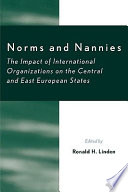
Norms and Nannies
By - Linden, Ronald Haly
Floor
-
Floor 1
ISBN 10 - 0742516032
ISBN 13 - 9780742516038
Book Status
-
3 Qnty Available with us.
Subject
-
Eastern Europe
Shelf No
-
13
Call Number
-
320.943 LIN
Physical Description
-
xvi, 404 pages : illustrations ; 23 cm